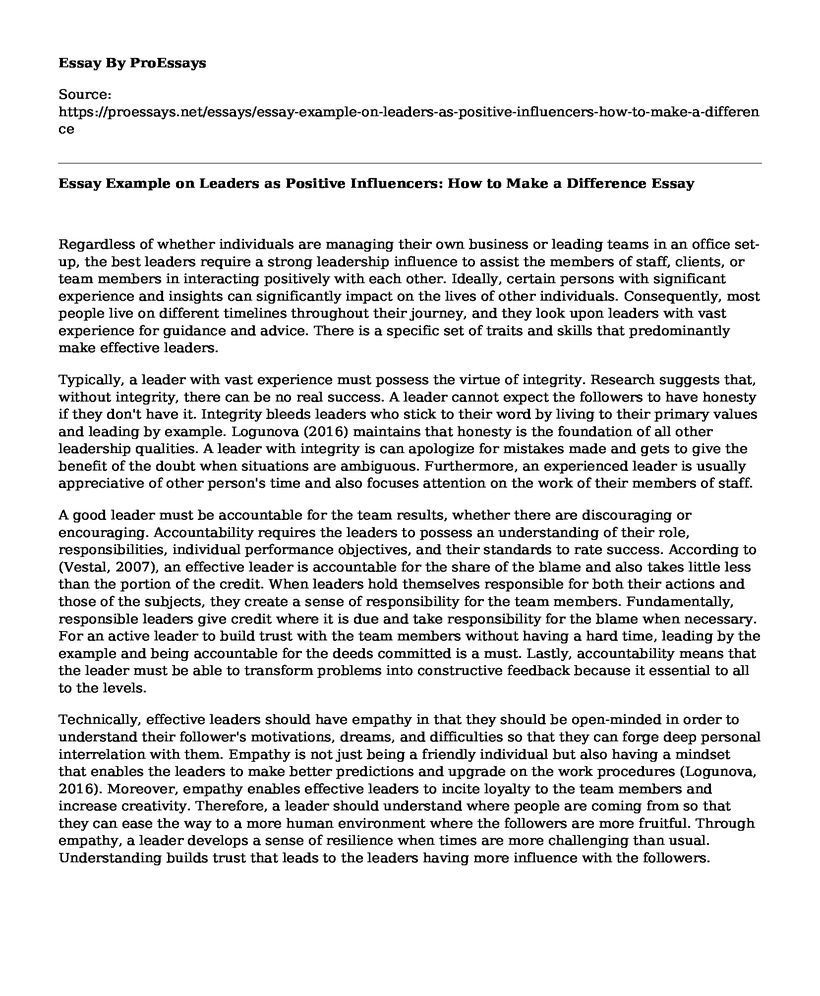Regardless of whether individuals are managing their own business or leading teams in an office set-up, the best leaders require a strong leadership influence to assist the members of staff, clients, or team members in interacting positively with each other. Ideally, certain persons with significant experience and insights can significantly impact on the lives of other individuals. Consequently, most people live on different timelines throughout their journey, and they look upon leaders with vast experience for guidance and advice. There is a specific set of traits and skills that predominantly make effective leaders.
Typically, a leader with vast experience must possess the virtue of integrity. Research suggests that, without integrity, there can be no real success. A leader cannot expect the followers to have honesty if they don't have it. Integrity bleeds leaders who stick to their word by living to their primary values and leading by example. Logunova (2016) maintains that honesty is the foundation of all other leadership qualities. A leader with integrity is can apologize for mistakes made and gets to give the benefit of the doubt when situations are ambiguous. Furthermore, an experienced leader is usually appreciative of other person's time and also focuses attention on the work of their members of staff.
A good leader must be accountable for the team results, whether there are discouraging or encouraging. Accountability requires the leaders to possess an understanding of their role, responsibilities, individual performance objectives, and their standards to rate success. According to (Vestal, 2007), an effective leader is accountable for the share of the blame and also takes little less than the portion of the credit. When leaders hold themselves responsible for both their actions and those of the subjects, they create a sense of responsibility for the team members. Fundamentally, responsible leaders give credit where it is due and take responsibility for the blame when necessary. For an active leader to build trust with the team members without having a hard time, leading by the example and being accountable for the deeds committed is a must. Lastly, accountability means that the leader must be able to transform problems into constructive feedback because it essential to all to the levels.
Technically, effective leaders should have empathy in that they should be open-minded in order to understand their follower's motivations, dreams, and difficulties so that they can forge deep personal interrelation with them. Empathy is not just being a friendly individual but also having a mindset that enables the leaders to make better predictions and upgrade on the work procedures (Logunova, 2016). Moreover, empathy enables effective leaders to incite loyalty to the team members and increase creativity. Therefore, a leader should understand where people are coming from so that they can ease the way to a more human environment where the followers are more fruitful. Through empathy, a leader develops a sense of resilience when times are more challenging than usual. Understanding builds trust that leads to the leaders having more influence with the followers.
Conclusion
Effective leaders help organizations to identify the characteristics of potential leaders. An example of a good leader is the Southwest CEO, James Parker. After the September 9/11 attacks, the federal government restricted airlines for a week. The passengers, together with the airline employees, were all shipwrecked in the plane. Packer being a great leader, made the passengers entertaining each other to avoid waiting time on their own. Even after the other airline cut their workforce, James kept all his members of staff together by generating a profit-sharing procedure for his workforce. The instance makes Parker a great leader since he was accountable for the employee's profits. Moreover, his creativity made both passengers and employees endure difficult times. The example shows that Parker had empathy, integrity, and he was also accountable for the circumstances.
References
Logunova, E. (2016). CONCEPTUAL RESEARCH OF THE ECONOMIC COMPUTER DISCOURSE "DESCRIBE A GOOD LEADER". Kognitivnye Issledovaniya Yazyka, 25, 836-841. https://doi.org/10.20916/2071-9639-2016-25-836-841
Vestal, K. (2007). Am I a good boss?. Nurse Leader, 5(2), 8-9. https://doi.org/10.1016/j.mnl.2007.01.007
Cite this page
Essay Example on Leaders as Positive Influencers: How to Make a Difference. (2023, Aug 29). Retrieved from https://proessays.net/essays/essay-example-on-leaders-as-positive-influencers-how-to-make-a-difference
If you are the original author of this essay and no longer wish to have it published on the ProEssays website, please click below to request its removal:
- A Summary of the Article "Leadership That Gets Results"
- Research Paper on Planning for Long-Term Success
- Proposed Advancement to the Crane Manufacturing System for Megacorps CMC
- Leadership Nursing: Creating Positive Change in Healthcare - Research Paper
- Essay Example on Ez-Pleeze Strategic Plan, SWOT Analysis & Strategic Recommendation
- Risk Management in Healthcare: Strategies for Improved Safety - Essay Sample
- Essay Sample on Invictus: Uniting a Nation Through Leadership and Equality







